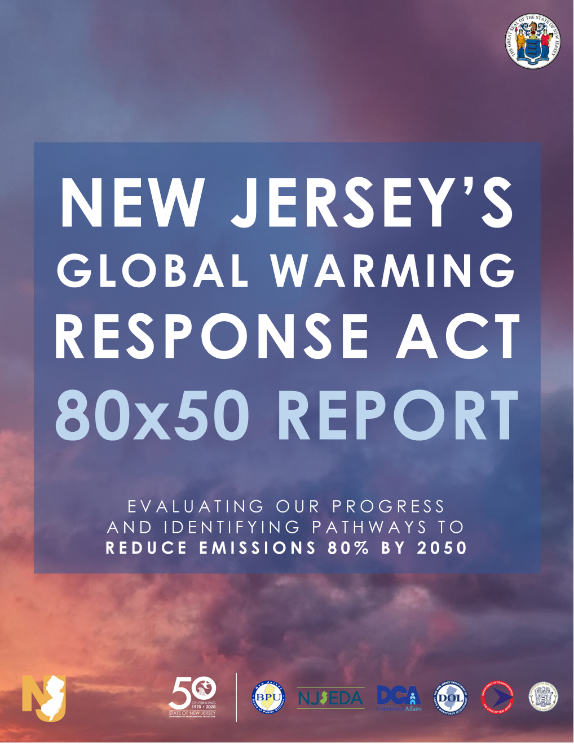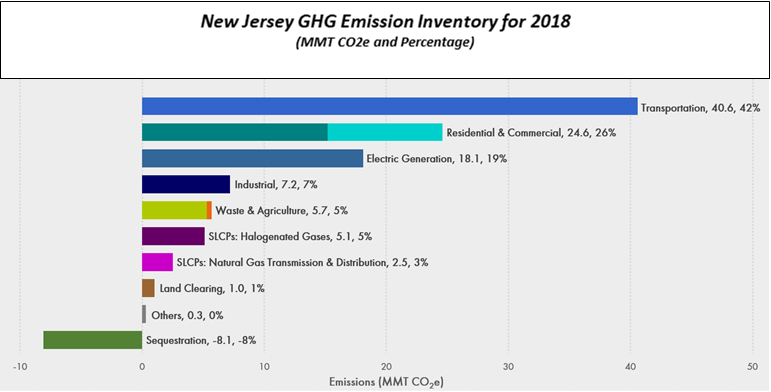
Murphy Administration Calls for Transformative Actions to Reduce Emissions Fueling Climate Change by 80% by 2050 (20/P042)
(20/P042) TRENTON – Climate change is adversely impacting New Jersey now, and steep and steady reductions in the Garden State’s emissions of greenhouse gases are necessary, the New Jersey Department of Environmental Protection explained today in a report to state lawmakers assessing the state’s progress in meeting the 2006 legislative mandate to reduce emissions by 80% by the year 2050.
The New Jersey Legislature acknowledged the need for New Jersey to implement emissions reductions when it passed the Global Warming Response Act, mandating that the state reduce emissions of greenhouse gas (GHG) and other climate pollutants by 20 percent below 2006 levels by 2020 and 80 percent below 2006 levels by 2050. DEP is required to monitor and assess emissions reductions and issue biennial reports to the Legislature recommending actions necessary to meet the 80x50 goal.
In presenting its sector-by-sector analysis of various pathways for meeting this goal, the “80x50 Report” – available at https://www.nj.gov/dep/climatechange/mitigation.html – is another component of Governor Phil Murphy’s comprehensive approach to climate change, integrating and building upon the strategies presented in the 2019 Energy Master Plan as informed by the modeling in the 2019 Integrated Energy Plan.
Together, these three components provide a roadmap for transformation that will reduce climate risks while growing New Jersey’s economy and preserving our natural treasures for generations to come. Although the Murphy Administration has made significant climate policy advances to date, if the state continues in a business-as-usual scenario without pursuing the initiatives recommended in the 80x50 Report, New Jersey’s emissions will continue to increase in a manner that undermines our hard-fought progress.
 “The 80x50 Report is a call-to-action for all of us in government and in New Jersey to roll up our sleeves and craft the next generation of climate-focused laws and policies,” said Governor Murphy. “Our Administration has taken the climate crisis head-on since day one. But the challenge before us demands more. As we have learned from the crisis brought about by COVID-19, we cannot spare a moment in taking the necessary steps that will prepare us for this next crisis. Together, we will meet this moment.”
“The 80x50 Report is a call-to-action for all of us in government and in New Jersey to roll up our sleeves and craft the next generation of climate-focused laws and policies,” said Governor Murphy. “Our Administration has taken the climate crisis head-on since day one. But the challenge before us demands more. As we have learned from the crisis brought about by COVID-19, we cannot spare a moment in taking the necessary steps that will prepare us for this next crisis. Together, we will meet this moment.”
Underscoring the need to pursue new initiatives to reduce emissions and sequester carbon through natural lands management practices, the 80x50 Report demonstrates that more action is necessary to meet the state’s climate goals. Over the next 30 years, New Jersey must implement an economy-wide transformation that expedites the deployment of renewable energy resources and facilitates a swift and steady transition from gasoline-powered to electric vehicles, among many other initiatives outlined in the report.
“We are pleased to present the Legislature, and all of our partners across the public and private sectors, with this roadmap for reducing emissions that fuel climate change,” said DEP Commissioner Catherine R. McCabe. “Make no mistake: the changes New Jersey must continue to undertake in the next thirty years are significant. But we know well the risks of inaction. Just as New Jersey is uniquely vulnerable to risks from climate change, so too is our great state uniquely positioned to turn this challenge into tremendous opportunity for our people, businesses and institutions.”
The 80x50 Report builds upon the 2019 Energy Master Plan, which outlines the energy sector’s pathway to attain 100% clean energy by 2050 and includes decarbonization measures beyond the energy sector.
“Today is another major step forward in achieving the Governor’s clean energy goals,” said New Jersey Board of Public Utilities President Joseph Fiordaliso. “The 80x50 Report is the result of the same strong collaboration across state government that will help us reduce our emissions to protect New Jersey from future impacts of climate change. Together, the Energy Master Plan and 80x50 Report outline the challenges of reducing greenhouse gases and a bold vision to meet those challenges for future generations of New Jerseyans.”
The report provides a progress report and presents pathways for new emissions-cutting initiatives across seven emissions “sectors”:

Key Findings & Objectives of the 80x50 Report
The recommendations in the 80x50 Report underscore the need for additional climate action beyond the measures already taken by the Murphy Administration. Fortunately, as a result of market and other forces that motivated power plants to transition from coal to natural gas over the last fifteen years, New Jersey has already successfully reduced emissions by 20% below 2006 levels. On the current trajectory, however, emissions would be higher in 2050 than they are today—estimated at just 12% below 2006 levels, undermining progress to-date and missing the 80x50 goal.
The objective of the 80x50 Report is to communicate the ability and limitations of existing policies and programs in reaching the 80x50 goal and to provide options in order to craft new initiatives to bridge the emissions reductions gap.
Additional recommendations discussed in more detail in the 80x50 Report include:
- Development of solar, wind and other zero-carbon energy generating sources to meet a more than doubling of projected electric demand by 2050;
- Deploying new technology and policy initiatives to reduce emissions from waste management and agricultural activities;
- Establishing regulatory mechanisms that better account for and reduce short-lived climate pollutants such as black carbon and methane; and
- Protecting and enhancing forest and marshlands through a statewide natural lands strategy.
Additional Information About the Murphy Administration’s Climate Policy
The 80x50 Report is one aspect of the Murphy Administration’s comprehensive climate policy endeavor, which is motivated by two primary components: (1) Resilience and Adaptation: strengthening New Jersey against adverse climate impacts through climate resilience planning and supportive regulatory reform, and (2) Mitigation: reducing the emissions of climate pollutants that fuel climate change so that we can mitigate against rising temperatures, seas and storms in the future.
These two components are complementary: preparing New Jersey for what is to come while reducing future emissions to help avoid today’s worsening conditions.
Beyond the 80x50 Report, other aspects of DEP’s climate policy include:
- New Jersey’s first-ever Scientific Report on Climate Change, which comprehensively documented the specific impacts of climate change to New Jersey, and serves as an important scientific basis for decision-making.
-
NJ Protecting Against Climate Threats (NJ PACT): A multi-faceted regulatory reform initiative to update New Jersey’s environmental regulations to more directly respond to the risks of climate change, including:
- Measures to reduce emissions through “Climate Pollutant Reduction” regulations
- Measures to assess and adjust for development risks from climate change and ensure greater resilience through a “Resilience Environment and Landscapes (REAL)” rule that amends existing environmental land use regulations.
- Development of Statewide Climate Resilience Strategy and a Coastal Resilience Plan, a cross-agency planning effort to promote the long-term mitigation, adaptation, and resilience of New Jersey’s economy, communities, infrastructure, and natural resources throughout the state in a manner consistent with the Scientific Report on Climate Change.
###
Distribution channels:
Legal Disclaimer:
EIN Presswire provides this news content "as is" without warranty of any kind. We do not accept any responsibility or liability for the accuracy, content, images, videos, licenses, completeness, legality, or reliability of the information contained in this article. If you have any complaints or copyright issues related to this article, kindly contact the author above.
Submit your press release